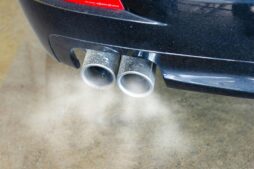Probe targets turbo diesel X3 2.0 engine of past model.
The German federal transportation agency has initiated an inquiry into potential manipulation of diesel exhaust emissions by BMW, according to a report by Bild.
The Kraftfahrt-Bundesamt (KBA) has accused a high-end car manufacturer of employing underhanded measures to manipulate emission levels during testing. The focus of the investigation is on the 2.0-litre turbodiesel engine equipped in the previous model of the X3, which was not available in the American market. According to the KBA report, the four-cylinder engine emits lower levels of nitrogen oxides when the air conditioning system is turned off.
This may seem peculiar, since all emissions examinations are carried out in controlled conditions without the use of air conditioning. Nevertheless, it has been discovered that the X3’s 2.0-liter diesel model emits noticeably lower levels of pollutants when the air-conditioner is not utilized, raising suspicions that it could be a deliberate defeat mechanism.
BMW could face severe consequences if the allegations turn out to be true. However, the company is dismissing them as a mere product defect.

In the event of a successful defense, the company will solely be responsible for addressing and remedying any issues in order to comply with emissions regulations.
Should the KBA investigation discover that BMW intentionally engaged in deceptive practices and used strategies to circumvent regulations, the company may be subjected to both criminal and civil consequences. This has the potential to prompt authorities to launch investigations into other vehicles for similar software manipulations. It is important to note that the 2.0-liter diesel engine is utilized in multiple models such as the 1 Series, X1, X2, X4, 3 Series, 4 Series, and 5 Series.
A representative from the KBA, who preferred to remain anonymous, informed Bild that they are collaborating closely with other groups. “The concern revolves around the alleged use of an unauthorized shutdown mechanism in the engine control system of a 2.0-liter diesel X3. The emission certifications in question were granted by the Irish Type Approval Authority. The NSAI, the Irish agency responsible for approvals, is in constant communication with the KBA.”

According to a source from KBA, “BMW was clearly very cunning in their use of the emissions trick, which is why it was such a challenge to uncover.” The company declined to respond to any inquiries and stated that they would not be providing any additional statements.
Nearly a decade has passed since the automotive industry was shaken by the Dieselgate scandal. Volkswagen Group was caught intentionally manipulating emissions tests by equipping certain diesel models with defeat devices. This deceitful practice affected approximately 11 million cars across the globe.
In the past, BMW and Volkswagen faced penalties for colluding to limit the implementation of technology aimed at reducing vehicle emissions. The two companies were collectively fined $1 billion, while Daimler, who brought forth the information as a whistleblower, was not penalized.







